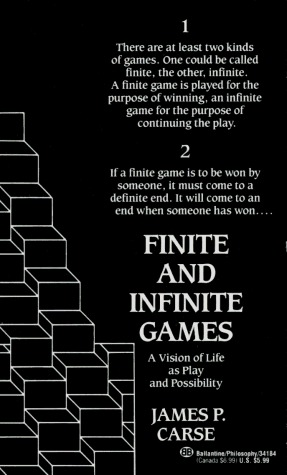What do you think?
Rate this book


180 pages, Mass Market Paperback
First published January 1, 1986
"There are at least two kinds of games. One could be called finite, the other infinite. A finite game is played for the purpose of winning, an infinite game for the purpose of continuing the play."
❝In slavery, for example, or severe political oppression, the refusal to play the demanded role may be paid for with terrible suffering or death. Even in this last, extreme case we must still concede that whoever takes up the commanded role does so by choice. Certainly the price for refusing it is high, but that there is a price at all points to the fact that oppressors themselves acknowledge that even the weakest of their subjects must agree to be oppressed.❞ (p. 11)
Because patriotism is the desire to contain all other finite games within itself—that is, to embrace all horizons within a single boundary—it is inherently evil.I can’t even begin to connect the concepts of “patriotism” and “contain all other finite games”. I’m pretty sure most folks that consider themselves patriots don’t have that desire.
You run ahead? Are you doing it as a shepherd? Or as an exception? A third case would be as a fugitive.
First question of conscience.
Are you genuine? Or merely an actor? A representative? Or that which is represented? In the end, perhaps you are merely a copy of an actor.
Second question of conscience.
Are you one who looks on? Or one who lends a hand? Or one who looks away and walks off?
Third question of conscience.
Do you want to walk along? Or walk ahead? Or walk by yourself? One must know what one wants and that one wants.
Fourth question of conscience.
Friedrich Nietzsche, Twilight of the Idols
